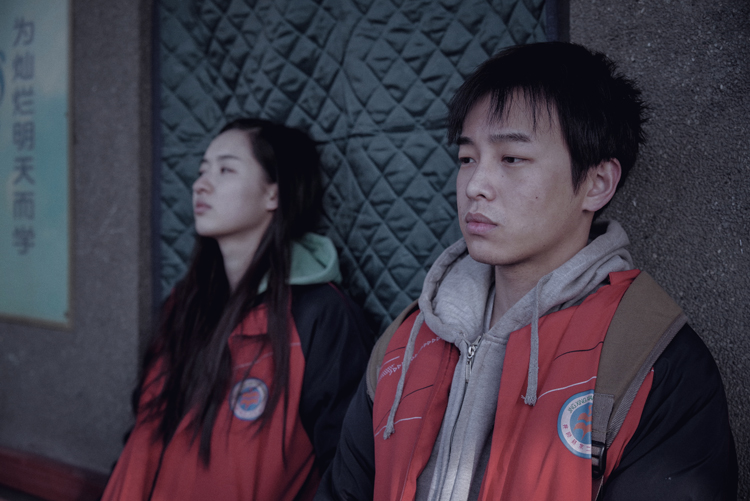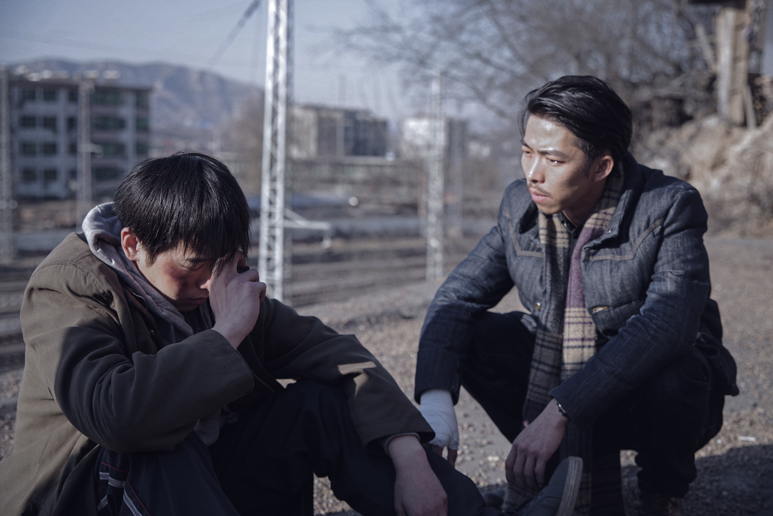Characters cope with crises in a blue-collar Chinese city in a stunning debut from writer and director Hu Bo.

The story behind An Elephant Sitting Still threatens to overwhelm the movie itself—that, and its four-hour running time and deeply depressing milieu. Don’t let it. This is a once-in-a-generation film, an epic of defiance against a ruthless society. Honest, sympathetic, incisive, it will stand as a masterpiece of its time.
So it’s all the more remarkable that this creative and technically assured work is the debut feature from writer, director and editor Hu Bo. A writer who was mentored by Béla Tarr, he completed three short films before teaming with producer Wang Xiaoshuai for this project.
For the script, Hu opened up one of his short stories about an elderly retiree (Liu Congxi) and his dog. An Elephant Sitting Still expands the scope of the story to include several other characters in and around a housing development in a gritty mining town.
High school student Wei Bu (Peng Yuchang) lives with a father bitter over losing his job and a mother who sells clothes to miners from the back of a cart. A cruelly dismissive vice dean at his high school tells Wei that he’ll likely end up a street vendor as well. That same day Wei earns the enmity of the school bully when he defends a fellow student.
Wei has a crush on fellow student Huang Ling (Wang Yuwen), unaware that she and the vice dean have been seeing each other. Huang has her own problems at home with a mother angry about the husband who abandoned them and a job marked by sexual abuse.
The school bully has a brother, Yu Cheng (Zhang Yu), head of a gang of petty crooks. In the opening scenes he’s caught with his friend’s wife. When his friend commits suicide, Yu readies to leave town, maybe for Manzhouli, where he’s heard of an elephant that draws crowds for its obstinate refusal to do anything but sit. But when his brother is injured by Wei, Yu has to stick around to avenge him.

For the rest of the day these interlocking stories will play out in a ghastly landscape of broken-down tenements, unheated classrooms, fast-food stalls, bus terminals, pool halls, rail yards, all under smog-gray, wintry skies. Everything the leads want is just out of reach. Instead they are assaulted by mean classmates, angry relatives, ex-girlfriends, grim bureaucrats, grifters, and even heckling nursing home residents. The temptation to give up, ultimately to kill oneself, never recedes.
Hu’s compact yet dense script fleshes out his characters with vivid details about how they live, where they go, what they see. Fan Chao’s expert cinematography pins them in dark bedrooms, silhouetted by windows, or in front of tired buildings. Long takes pull viewers deep into the characters’ lives just as their troubles close in on them.
It’s a dark, depressing journey, but the astonishing thing about An Elephant Sitting Still is how uplifting it is. Hu’s empathy, his creative energy, his grasp of technique combine in a work that feels more realistic and cinematic than celebrated auteurs.
Despite its running time there is very little fat in Elephant: even the tiniest gestures pay off as the story unwinds. Hu plays with time in subtle ways, moving ahead or back, repeating scenes from different viewpoints. The long takes help the director strip away narrative conventions of typical movies. They build incredible suspense as Hu stages intricate shots that move in close on faces or pull back to reveal new dynamics in changing landscapes.
The story takes place in China, but makes just as much sense in the Rust Belt or post-Stalinist Eastern Europe or anywhere people feel trapped. Elephant is not a difficult film to follow, but its language and running time are real deterrents for viewers. It’s hard to see what Hu could have cut without damaging both his story lines and his mise en scène.
Hu reportedly argued with Wang Xiaoshuai over editing. For whatever reasons, Hu took his life in the final stages of post-production. His movie delivers a different message, one of hope despite all that’s wrong.


